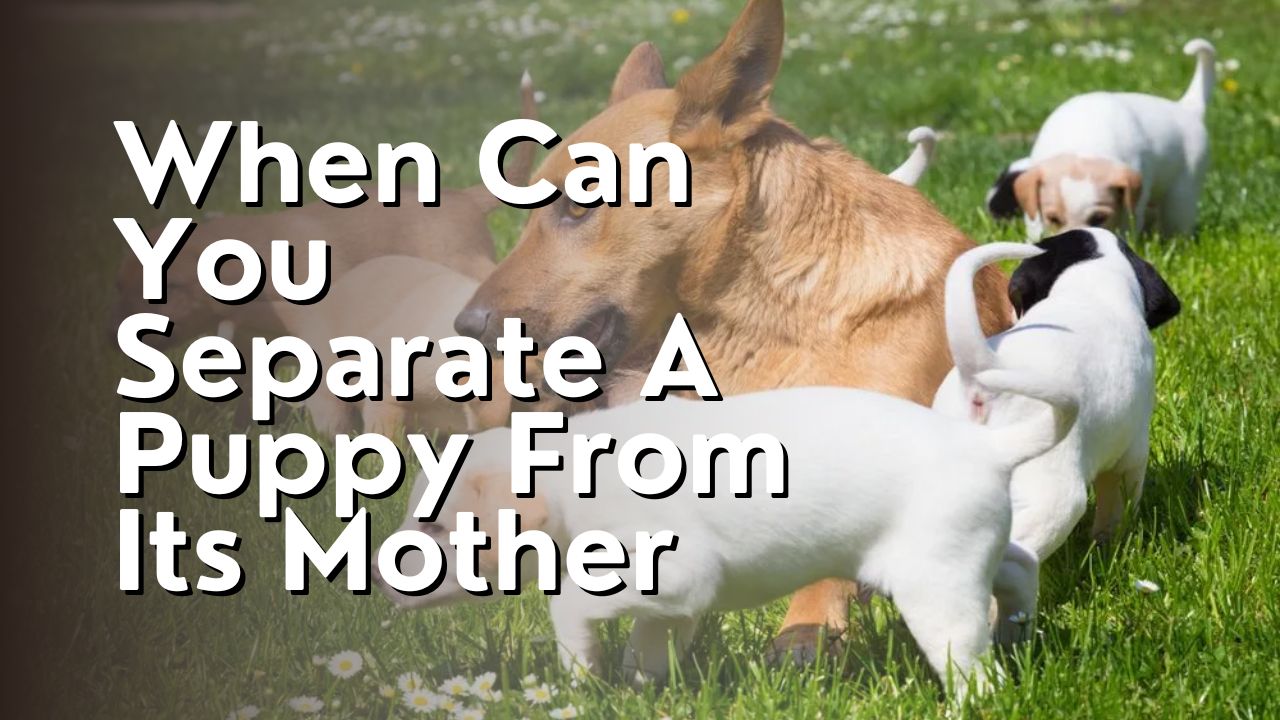When can you separate a puppy from its mother?
As a dog owner and enthusiast, I understand the importance of this question. The bond between a mother and her offspring is crucial for the development and well-being of the puppies.
In this article, we will explore the developmental milestones of puppies and discuss the recommended age for separation. We will also delve into the potential risks of early separation and provide tips for a smooth transition.
It is essential to approach this topic with sensitivity and knowledge to ensure the best outcome for both the puppy and the mother. So, if you’re curious about when it is appropriate to separate a puppy from its mother, join me as we navigate this important aspect of canine care.
Understanding the Importance of the Mother-Offspring Bond
Understanding the bond between a puppy and its mother is crucial in determining when they can be separated. The mother-offspring bond plays a vital role in the puppy’s development and overall well-being. Puppies rely on their mother for warmth, nourishment, and socialization skills. It is during this time that they learn important lessons about communication, boundaries, and social interaction.
The first few weeks of a puppy’s life are critical for its physical and emotional development. It is during this time that they learn important skills such as how to walk, how to play, and how to interact with others. Their mother provides them with essential care, teaching them the basics of survival.
Separating a puppy from its mother too early can have negative consequences. Puppies that are taken away too soon may struggle with socialization and may develop behavioral issues later in life. They may have difficulty forming healthy relationships with other dogs and humans.
Ideally, puppies should stay with their mother and littermates until they are at least eight weeks old. This allows them to develop important social skills and ensures that they receive the necessary care and nourishment. It is important to consult with a veterinarian or breeder to determine the best time to separate a puppy from its mother, as individual circumstances may vary.

Developmental Milestones of Puppies
As a puppy owner, it’s important to be aware of the developmental milestones that your new furry friend will reach. These milestones not only indicate your puppy’s growth and progress, but also provide valuable insights into their physical and cognitive development. Here are four key developmental milestones to keep an eye on:
- Motor Skills: Puppies start by wobbling around on unsteady legs, but soon they will be running, jumping, and playing with ease. It’s fascinating to observe their progression from clumsy movements to agile coordination.
- Socialization: During the early weeks, puppies learn vital social skills by interacting with their littermates and mother. They start recognizing and responding to human voices, learning to play appropriately, and becoming more comfortable with new people and environments.
- Teething: Just like human babies, puppies go through a teething phase. They will chew on everything in sight to relieve discomfort. Providing appropriate chew toys is crucial to saving your furniture from their sharp little teeth.
- House Training: Puppies gradually develop bladder and bowel control, learning to indicate their need to go outside. Consistent training and positive reinforcement help them understand the appropriate place to relieve themselves.
Understanding these milestones will help you track your puppy’s progress and provide the necessary support and guidance during this crucial period of its development.
Recommended Age for Separation
During this time, it’s important to remember that your furry bundle of joy relies on you to provide a nurturing environment that fosters their independence and growth. When it comes to separating a puppy from its mother, it’s crucial to wait until the recommended age. The general consensus among experts is that puppies should stay with their mother and littermates until they are at least 8 weeks old.
Separating a puppy too early can have negative consequences on its social and emotional development. During the first few weeks of life, puppies learn important social skills from their mother and siblings. They learn how to interact with other dogs, establish boundaries, and develop bite inhibition. By staying with their mother, puppies also receive important nutrients from her milk, which helps boost their immune system.
To help you better understand the recommended age for separation, here’s a breakdown:
| Age (weeks) | Developmental Milestones |
|---|---|
| 0-2 | Neonatal Stage |
| 2-4 | Transitional Stage |
| 4-8 | Socialization Stage |
| 8+ | Recommended Age for Separation |
By waiting until the recommended age, you are giving your puppy the best chance for a healthy and well-adjusted life. Remember, patience is key when it comes to your furry friend’s development.
Potential Risks of Early Separation
Be aware of the potential risks involved in separating a puppy from its mother too early, as it can greatly impact its social and emotional development, leaving them vulnerable and unprepared for the world. Puppies learn crucial life skills from their mother, such as bite inhibition and proper socialization with other dogs. If separated too early, they might miss out on these valuable lessons, leading to behavioral issues later on.
One of the main risks of early separation is the development of separation anxiety. Puppies rely on their mother for comfort and security, and being abruptly taken away from her can cause distress and anxiety. The absence of their mother can lead to excessive barking, destructive behavior, and even self-harm.
Additionally, early separation can result in poor social skills. Puppies learn important canine communication cues from their mother and littermates. Without this exposure, they may struggle to interact appropriately with other dogs and humans. This can lead to fear-based aggression or difficulty in forming healthy relationships.
Furthermore, early separation can affect a puppy’s overall resilience and confidence. The mother provides a sense of stability and helps the puppy navigate new experiences. Without her guidance, a puppy may become more fearful and insecure, making it difficult for them to adapt to new environments and situations.
In conclusion, separating a puppy from its mother too early can have detrimental effects on its social and emotional well-being. It is crucial to allow them enough time with their mother to develop essential life skills before introducing them to the world.

Tips for a Smooth Transition
Making sure your new furry family member feels safe and loved during the transition is essential for their well-being. Here are some tips to help make the separation from their mother as smooth as possible:
- Provide a comfortable and quiet space: Set up a cozy area in your home where your puppy can retreat to when they need some alone time. Make sure it is quiet and free from any potential dangers.
- Stick to a routine: Establishing a consistent daily routine will help your puppy feel secure and confident. This includes regular feeding times, potty breaks, and play sessions.
- Gradually introduce new experiences: Slowly introduce your puppy to new people, places, and experiences. This will help build their confidence and prevent them from becoming overwhelmed.
- Use positive reinforcement: Reward your puppy with praise, treats, and affection whenever they exhibit desired behaviors. This will reinforce positive associations and help them adjust to their new environment.
- Be patient and understanding: Remember that your puppy is going through a major life change. It may take time for them to adjust and feel comfortable in their new home. Be patient and understanding, and provide them with plenty of love and reassurance.
By following these tips, you can help ensure a smooth transition for your new puppy and set them up for a lifetime of happiness and well-being.
Frequently Asked Questions
Can I separate a puppy from its mother before it reaches the recommended age?
I wouldn’t recommend separating a puppy from its mother before it reaches the recommended age. It’s important for puppies to stay with their mother and littermates to learn social skills and receive proper care.
How long should a puppy stay with its mother before separation?
Puppies should stay with their mother for at least 8 weeks. This period is crucial for their development, socialization, and learning from their mother. Separating them too early can have negative consequences on their physical and emotional well-being.
What are the potential consequences of separating a puppy from its mother too early?
Separating a puppy from its mother too early can lead to various consequences. These include behavioral issues, anxiety, difficulty with socialization, and challenges in learning proper dog manners and communication skills.
Are there any long-term effects on the puppy’s behavior if it is separated from its mother too soon?
Separating a puppy from its mother too soon can have long-term effects on its behavior. It may struggle with socialization, develop separation anxiety, and have difficulty with impulse control.
Can I adopt a puppy that has been separated from its mother early and still have a successful transition?
Yes, you can adopt a puppy that has been separated from its mother early and still have a successful transition. With proper care, training, and socialization, the puppy can adapt well and become a happy and well-adjusted pet.
Conclusion
In conclusion, it’s crucial to consider the importance of the mother-offspring bond when determining the appropriate age for separating a puppy from its mother. Developmental milestones, such as weaning and socialization, should be taken into account to ensure a smooth transition for the puppy.
Separating a puppy too early can lead to potential risks and negative effects on its physical and emotional well-being. By waiting until the recommended age for separation, we can help puppies grow into happy and healthy adult dogs.


